Ci sono molti segni inquietanti che mostrano che devi consultare un gastroenterologo e in questo post imparerai a quali sintomi prestare attenzione. Un gastroenterologo è un professionista medico e medico che ha subito una formazione rigorosa e ampia per imparare a gestire, trattare e curare circostanze mediche legate al tratto gastrointestinale. Queste aree includono l'intestino, lo stomaco, il fegato, l'esofago e il retto.
Con tale titolo che richiede oltre 5 anni di formazione in “medicina interna” e “Gastroenterologia” (al termine della laurea in medicina); I medici gastrointestinali forniscono cure e trattamenti eccezionali e generalmente hanno più successo dei medici quando si tratta di diagnosi e trattamento delle complicanze gastrointestinali.
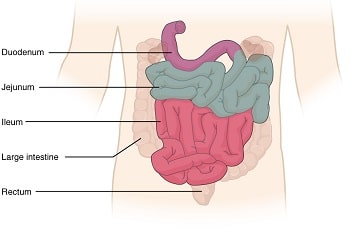
Sommario
I gastroenterologi ricevono una formazione specializzata in "endoscopia", che è la pratica di utilizzare un "tubo" piccolo e stretto, ma flessibile con una fotocamera incorporata che verrà utilizzata per navigare nel tratto gastrointestinale durante procedure, interventi chirurgici o test diagnostici per vedere se ce ne sono sono presenti malattie o escrescenze.
Quando si tratta di problemi medici gastrointestinali, cercare il trattamento da un gastroenterologo ti assicurerà di ricevere il trattamento più efficace possibile poiché riceverai un trattamento da un professionista medico che ha l'esperienza di formazione unica e approfondita che ti consentirà di ricevere cure di alta qualità e "complete" per qualsiasi complicanza medica correlata all'apparato gastrointestinale che potresti incontrare.
È statisticamente dimostrato attraverso l'uso di studi che i gastroenterologi eseguono colonscopie e cure complete per problemi gastrointestinali con un tasso di successo più elevato rispetto ai trattamenti forniti da altri tipi di medici. Ciò significa per te che riceverai un trattamento che rileverà con precisione la presenza di cancro o polipi, riducendo al contempo la possibilità di una complicanza medica derivante dal trattamento (i pazienti trattati con gastrointestinale possono anche aspettarsi di trascorrere meno tempo in l'ospedale).
In questo articolo, tratteremo i "15 principali segnali di pericolo di cui hai bisogno per vedere un gastroenterologo" che ti aiuteranno a determinare se hai i sintomi di una complicanza medica che richiederebbe l'attenzione e il trattamento di un gastrointestinale dottore.
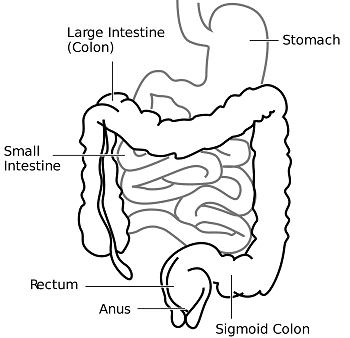
Quando inizi a riconoscere per la prima volta "dolori" appena formati o qualsiasi segno/sintomo derivante dalla regione del tratto digestivo come bruciore di stomaco, dolore addominale, diarrea o costipazione, potresti chiederti se dovresti visitare o meno un medico regolare, un internista o un gastroenterologo (specialista della digestione). Chi scegli di diagnosticare le tue condizioni all'inizio della loro comparsa può variare in base a una serie di fattori.
In alcune situazioni, fare la scelta giusta di consultare un medico o un gastroenterologo potrebbe non essere chiaro, ma di seguito ti aiuteremo a comprendere i sintomi per cercare problemi gastrointestinali che dovrebbero essere diagnosticati e trattati da un medico gastrointestinale.
Se si verificano solo ora sintomi o dolori nell'area digestiva per la prima volta, il primo passo potrebbe essere quello di chiedere consiglio al medico di base, come il medico di base o l'internista.
Si spera che questo sia un medico con cui hai costruito una relazione nel tempo poiché avrebbe accesso totale alla tua storia medica e terapeutica che può essere rivista per aiutare a determinare cosa sta causando i sintomi che stai riscontrando.
Dopo aver incontrato il medico e avergli fornito i sintomi, verrà eseguito un esame fisico per determinare cosa debbano essere condotti o meno i test. Una volta che il medico ha completato l'esame fisico e ha una buona idea di cosa ti sta causando gli improvvisi dolori gastrointestinali, può determinare che il trattamento deve essere fornito da uno specialista in grado di fornire cure di recupero affettivo. In questo caso, lo “specialista” sarebbe il Gastroenterologo.
Dr. Tarugu, un gastroenterologo esperto e premiato del sud della Florida raccomanda che le persone che stanno costantemente vivendo riacutizzazioni sporadiche o ricorrenti in condizioni precedentemente diagnosticate (come colite ulcerosa, morbo di Crohn o IBS) dovrebbero cercare immediatamente un trattamento da un gastroenterologo per evitare ulteriori crescite o complicazioni maturità.
Durante il trattamento da parte del gastroenterologo, lui/lei aggiornerà il medico con lo stato delle sue condizioni e i progressi che si stanno facendo. Questi aggiornamenti aiuteranno il tuo medico di base ad avere una buona comprensione del tuo stato, il che aiuterà il medico a fornirti cure adeguate in fondo alla lista come supporto post-recupero. Un paio di altre malattie gastrointestinali che i medici gastrointestinali curano sono malattie che si trovano all'interno dell'area del pancreas o del fegato.
Se il tuo medico di base sospetta che in queste aree stiano sorgendo problemi, è lecito ritenere che verrai indirizzato a un gastroenterologo locale per una diagnosi approfondita e quindi sarà possibile elaborare un piano di trattamento.
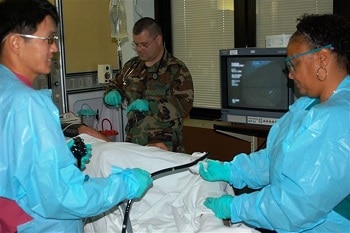
Ciascuno è un segno unico di condizioni potenzialmente gravi che non dovrebbero essere liquidate come "non importanti" poiché ciascuno dei sintomi sopra elencati potrebbe comportare segnali di complicanze molto peggiori se non diagnosticati e trattati "presto".
Di seguito, tratteremo cosa potrebbe significare ciascuno di questi sintomi e perché è importante cercare la guida e il trattamento di un medico gastrointestinale il più rapidamente possibile.
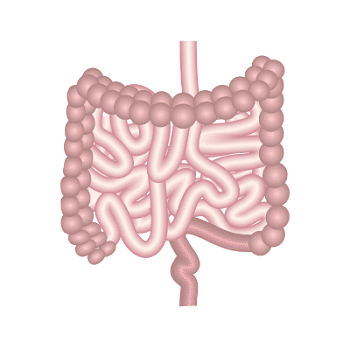
Si stima che un totale di 60 milioni di persone negli Stati Uniti soffrano e soffrano di bruciore di stomaco in media almeno una volta al mese con circa 15 milioni di persone che soffrono della condizione "ogni giorno". I sintomi di indigestione acida (bruciore di stomaco) sono più tipici tra le donne in gravidanza e gli anziani.
C'è una condizione chiamata "reflusso gastroesofageo" che è una condizione corporea che fa sì che l'acido dello stomaco fluisca all'indietro e ritorni nell'esofago. Per questo motivo, alcuni individui, sfortunatamente, sperimenteranno sintomi derivanti da questo quando si verifica questo processo (che potrebbe essere giornaliero, settimanale o mensile).
Uno dei primi segni di vedere un gastroenterologo per il bruciore di stomaco è l'esperienza di sentire un caldo disagio proveniente dalla regione dietro lo sterno. Questa sensazione tende a transitare nella zona della gola e del collo, quindi un disagio di qualsiasi tipo in quest'area dovrebbe essere un segnale di avvertimento che è necessario consultare un gastroenterologo per la diagnosi/trattamento.
Un altro segnale di avvertimento del reflusso acido è un sapore "acido" o "amaro" nella parte posteriore della gola poiché questo è il sapore dell'acido dello stomaco. Poiché i sintomi da pressione riscaldata del bruciore di stomaco possono durare fino a diverse ore (e peggiorare dopo aver mangiato), un'agitazione così costante in quest'area dovrebbe indurti a cercare un test diagnostico immediato da un medico gastrointestinale.
Se si verificano tali sintomi 2 o più volte a settimana, o si verificano perdita di peso, perdita di sangue o cibo appiccicoso, allora potresti avere un caso di bruciore di stomaco che è molto grave. Se si verificano tali sintomi, potresti avere una condizione nota come "malattia da reflusso gastroesofageo (o" GERD per tiro).
Prima di poter iniziare a capire le cause esatte della malattia da reflusso gastroesofageo o GERD, devi prima capire quali sono le cause del bruciore di stomaco. La maggior parte delle persone sentirà l'agitazione del bruciore di stomaco nel caso in cui il rivestimento dell'esofago venga a contatto con i liquidi dello stomaco per un periodo di tempo prolungato .
Questi fluidi gastrici sono costituiti da alcuni materiali diversi, inclusi enzimi e acidi correlati alla digestione. Poiché l'acido dello stomaco rimane in contatto con il rivestimento dell'esofago, può verificarsi una lesione all'esofago che provoca una sensazione di disagio, bruciore e dolore.
Mentre una valvola muscolare verso il fondo dell'esofago (nota come "Sfintere esofageo inferiore" o "LES") mantiene l'acido nello stomaco e lontano dall'esofago (quando funziona correttamente), questo non è il caso se un individuo ha o "malattia da reflusso gastroesofageo" o "GERD" poiché il "LES" ha la tendenza a rilassarsi regolarmente, consentendo all'acido dello stomaco di refluire nell'esofago.
Tale sintomo dovrebbe essere trattato il prima possibile da un medico gastrointestinale per fermare lo sviluppo di ulteriori complicazioni.
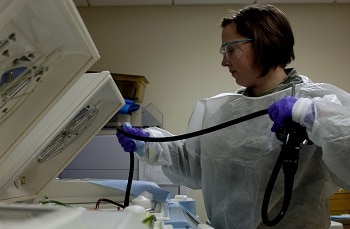
Durante la visita del medico gastrointestinale verrà formulato un piano di trattamento/recupero basato sui risultati diagnostici.
Se ti ritrovi ad auto-medicare più di due volte a settimana per il bruciore di stomaco, questo da solo è un segno della necessità di essere curato da un gastroenterologo. Condizioni che non vengono trattate da un GI esperto possono potenzialmente portare a una complicazione più grave.
Hai problemi con la deglutizione dei cibi? Hai difficoltà a prendere i liquidi? Stai riscontrando gonfiore sporadico o consistente nella zona della gola? In tal caso, questo potrebbe essere un segnale di avvertimento di una condizione minore o grave che dovrebbe indurti a cercare un gastroenterologo per la diagnosi. "Qualsiasi tipo di dolore o agitazione causato dall'acqua potabile può essere un segnale di avvertimento di un grave problema gastrointestinale", ha affermato il dottor Vikram Tarugu, un gastroenterologo esperto, certificato e pluripremiato.
Altri segnali di avvertimento da tenere presente che il gastroenterologo dovrà sapere è se la tua difficoltà di deglutizione è accompagnata o meno da singhiozzo, raucedine della gola, tosse frequente o sensazione di sazietà dopo aver mangiato una porzione molto piccola di cibo. Se si verifica uno di questi segnali di pericolo potenzialmente pericolosi, probabilmente la causa potrebbe essere il cancro esofageo. Pertanto, se riscontri uno di questi segnali di avviso, non esitare chiedere consiglio dal tuo medico di base o da un gastroenterologo se hai già una relazione con uno. Senti un odore insolito dal passaggio del gas? Questo potrebbe essere un segnale di avvertimento di parassiti infettivi
Abbastanza sorprendentemente, in media, una persona tipica emette quasi 2 litri di gas al giorno a meno che non si verifichino anomalie all'interno del tratto digestivo. Un segnale di avvertimento a cui prestare molta attenzione è se si avverte dolore o fastidio all'interno dell'area addominale durante i periodi di passaggio di gas o durante l'evacuazione.
Inoltre, se i movimenti intestinali e il passaggio di gas hanno iniziato ad avere un odore insolitamente orribile, questo potrebbe essere un segno che hai la giardia, un parassita che irrita e infetta l'intestino. Poiché la giardia può peggiorare se non trattata, un segnale di avvertimento come questo non dovrebbe essere trascurato.
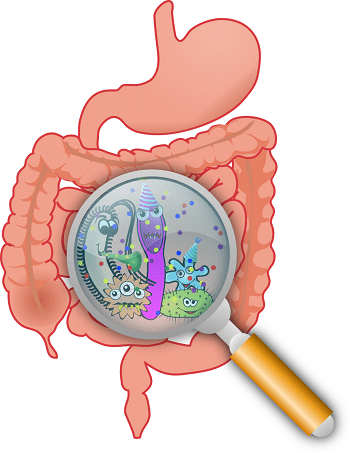
Abbiamo tutti sperimentato gonfiore ad un certo punto della nostra vita, ma se diventa persistente, allora c'è la possibilità che ci sia una causa sottostante. Se ti sei accorto che hai difficoltà a mettere i pantaloncini quando solo pochi giorni fa li indossavi senza problemi, allora potresti "saltare fuori dall'andare in palestra" non è da biasimare.
Il gonfiore si verifica semplicemente quando la nostra assunzione di cibo/aria è eccessiva e il nostro corpo non se ne libera adeguatamente. Tuttavia, se il gonfiore inizia improvvisamente senza una ragione apparente (non mangi da un po' di tempo) e si verifica insieme alla presenza di dolore o sangue nelle feci, questo potrebbe essere un segnale di avvertimento che è ora di consultare un gastroenterologo.
Un tale segno potrebbe significare che lo sviluppo di celiachia, GERD (malattia da reflusso gastroesofageo), IBS (sindrome dell'intestino irritabile) costipazione o calcoli biliari è iniziato.
In ogni caso in cui riconosci sangue nelle feci o anormali dolori acuti nell'area addominale durante il passaggio di gas o il movimento intestinale, devi assolutamente essere diagnosticato e curato da un medico gastrointestinale.
Un segnale di avvertimento che dovrebbe essere diagnosticato da un medico gastrointestinale è la perdita di peso improvvisa, inaspettata e inspiegabile. Sebbene l'improvvisa perdita di peso possa essere attribuita a vari altri problemi di salute, in genere il posto migliore per cercare la radice del problema è il sistema digestivo.
Il Dr. Tarugu, un gastroenterologo certificato nel sud della Florida con oltre 2.100 procedure completate con successo, ha affermato che "il primo problema che si desidera isolare come causa di un'improvvisa perdita di peso è il cancro dello stomaco, del pancreas o del colon".
Pertanto, se si verifica un'improvvisa perdita di peso, consultare un gastroenterologo in modo da essere sicuri che non si tratti di cancro o malattia di Chron/celiachia (che ridurrebbe le capacità del tuo corpo di assorbire i nutrienti vitali).
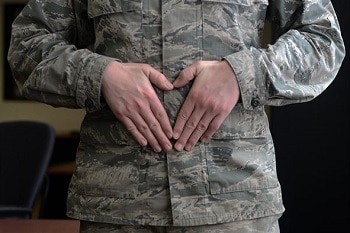
Durante l'evacuazione, probabilmente sarebbe un po' preoccupante notare alcune scie rossastre sulla carta igienica poiché sappiamo tutti che il sanguinamento da una tale area non è normale. L'emorragia dall'area del retto può essere un segno di una condizione potenzialmente pericolosa e dovrebbe essere diagnosticata e trattata "immediatamente".
Sebbene sia possibile che l'emorragia sia causata dalle emorroidi, in caso contrario, sarà assolutamente necessario rivolgersi a un gastroenterologo, soprattutto se l'emorragia si ripresenta e se l'individuo ha più di 40 anni.
Indigestione (chiamata anche "dispepsia" dal punto di vista medico) è il termine per descrivere una condizione che coinvolge più sintomi diversi che si verificano durante il consumo di un pasto. Alcuni di questi sintomi possono includere la sensazione di essere "imbottiti" una volta completato un pasto, oltre a un "dolore" o una "sensazione di bruciore" nella parte superiore dell'addome.
L'indigestione è una condizione abbastanza comune tra gli adulti di età medio-anziana e si verifica su base mensile, settimanale o addirittura giornaliera.
Se si verifica uno dei seguenti sintomi, cercare consiglio e trattamento da un medico gastrointestinale è essenziale per la prevenzione delle complicanze:
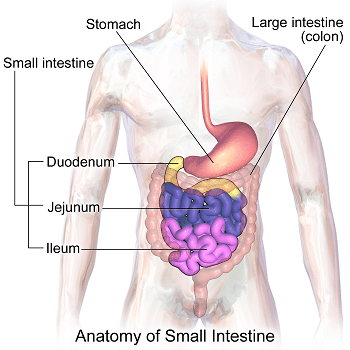
When visiting your GI doctor a treatment/recovery plan will be formulated based upon the diagnostic results.
Possible treatment suggestions may include:
Keep in mind that indigestion and heartburn are two different conditions with each having their own unique symptoms.
However, if you’re experiencing the symptoms of both then it’s possible that you’re suffering from both of the two. Regardless, whether the agitation is minor or severe it’s important that you take such a warning signal seriously and seek treatment from a GI doctor that will help to diagnose and remedy the condition(s).
Nausea is quite an unpleasant experience and can use intense feeling of dizziness, minor to severe discomfort and paint in the abdominal area. On the other hand, often times accompanies by nausea, vomiting is the occurrence of a contraction from the stomach that during times of nausea can help one feel a bit better as the content of stomach is during vomiting is the process in which it’s propelled up thru the esophagus.
Intense and consistent vomiting could possibly be a warning sign of a Gastroenteritis which can be treated by a gastroenterologist. Gastroenteritis is known to be a viral infection that causes inflammation within the digestive tract and can be treated thru the use of medication(s) which will be recommended by the gastroenterologist that you choose to visit.
Are you experiencing a dullish pain in the stomach, weight loss, the undesired to intake food due to pain or nausea/vomiting? If so, this could be a sign of a minor yet serious matter. Such warning signs could possibly mean that you’re suffering from a Peptic Ulcer which can be diagnosed by a gastroenterologist thru the use of an upper GI series or an endoscopy.
If you’re experiencing upper abdominal pains (one of the biggest signs of a stomach ulcer ) be sure that you seek the diagnosis/treatment from a GI doctor so you can have it treated while preventing the possibly of further complications arising from the condition.
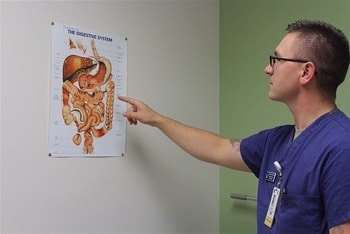
Individuals that may have GI disorders can suffer from warnings signs that are both painless and pain-induced. Such symptoms can be diarrhea/constipation (in some cases, irritable bowel syndrome). Such signs, whether they’re painful or not, could possibly be a sign of a condition other then IBS known as “centrally mediated abdominal pain syndrome” (or “CAPS” for short) which used to be medically referred to as “functional abdominal pain syndrome” (FAPS).
CAPS is a gastrointestinal disorder and is typically caused by a change in the nerve impulse sensitivity and will cause intense and frequent pain in the abdominal section which for some individuals will be quite severe.
In some cases, pain can be so intense and persistent that it’ll affect you in the similar way as the pain from a tooth ache as it can consume your focus/life since it has a tendency to “not go away” for extended periods of time. If such warning signs are present, seek counsel from a gastroenterologist where an antidepressant may be prescribed to not only reduce anxiety caused by the pain but to help alleviate the pain all together.
If you’re experiencing the feelings of belching, bloating or flatulence (build-up of gas in the alimentary canal), these could be warning signs that you you could possibly be suffering from a number of different conditions including allergies to certain foods, lactase deficiency, peptic ulcer disease or a H. Pylori Infection. Each of these we’ll cover below more in-depth so you can determine the possible cause(s) of your symptom(s).
Food Allergies – While not typical, the most severe allergic reaction that one can inherit from the ingestion of food is known as “anaphylaxis” which could possibly be life-threatening. Studies have shown that 90% of all allergies related to foods are caused from the ingestion of soy, wheat, shellfish, tree nuts, fish, peanuts, milk and eggs. If pain tends to arise after consuming such food items then this may be a signal that you need to seek the treatment of a gastroenterologist.
Lactase Deficiency – While lactase deficiency is pretty common with an estimated 3 million cases per year alone within the US, it’s an issue that’s brought upon individuals whose body has difficulty with digesting the sugar contents within dairy products. These issues arise in the digestive tract and can be treated by a GI doctor thru the use of recommended off-the-shelf medication(s) or by a prescribed medication (depending on the severity of your condition.

Individuals suffering from “Lactase Deficiency” can expect such warning signs to arise within 30 minutes to 2 hours from the consumption of milk or other food items containing dairy.
While symptoms aren’t always noticeable there are some warning signs that if arise should prompt you to see a gastroenterologist.
If you experience persistent and severe abdominal pain, have difficulty with swallowing or have bloody/black vomit that has the appearance of coffee grounds then seek diagnosis from a GI doctor for treatment as these are all warning signs that need attention before complications arise.
If you experience a yellowing of the eyes/skin then it’s very well possible that this is the warning sign that Jaundice is occurring. Jaundice is a condition in which there’s an excessive amount of bilirubin in the blood which is known, medically, as hyperbilirubinemia.
Bilirubin is a “yellow pigment” substance that affects the color pigmentation in the white of your eyes and your skin tone.
If you’re experiencing such signs of this condition schedule an appointment to see a GI doctor as quickly as possible as if not, further complications could develop which could lead to:
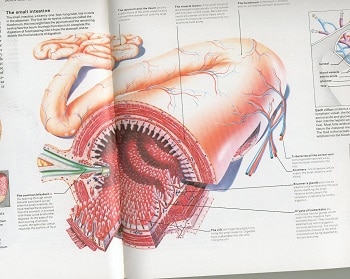
One warning signing of a possibly serious complication that should be diagnosed immediately is pain experienced in the abdominal section with the occurring pain spreading/radiating to your back. Such a feeling is a strong indicator and warning sign of “gallstone pancreatitis ”.
Gallstones are a pretty common cause of pancreatitis and this is caused by gallstones that develop in the gallbladder to block the bile duct which puts a stop to the pancreatic enzymes from being able to travel to your small intestine (which forces them to return to the pancreas).
During this process, these pancreatic enzymes will agitate the pancreas cells which will cause inflammation which can cause a great deal of pain that will radiate from the abdomen to the back. In some cases, this feeling of pain will also be accompanied by a tingling, prickly sensation. If such warning signs arise, seek attention from a physician or preferably a gastroenterologist who will help to diagnose the issue so proper treatment can be prepared/prescribed.
In the event that the gastroenterologist determines that your pancreatitis us due to the gallstones then an ECRP (Endoscopic Retrograde Cholangiopancreatography) will be performed which is a procedure conducted by the GI doctor to remove the stones.
For heavier/obese women it’s important to take cautious note of any pain that stems from the upper right-hand side of the abdominal sections as such a pain could be the indicator of “gallstone pancreatitis” (a prominent condition for heavier-set women). What’s causing such pain is the process of the gallstones blocking the bile duct which causes a chain reaction as this will stop any/all pancreatic enzymes from traveling to the small intestine providing the enzymes with no choice but to return to the pancreas. If the gallstones travel from the gallbladder to the common bile duct, gallstone pancreatitis can develop which is a condition that can continue to worsen and mature in pain while also leading to further complications if not treated.
If you’re medically considered to be “obese” and have had such pain on a regular or consistent basis, consult a GI doctor as treatment in the form of medication and surgeries are available (depending on the severity of the condition). Only making 1-2 bowel movements per week? Difficulty with going? Pain during defecating?
There are a few signs to look out for and notate when looking for signs of possible gastrointestinal complications. A few of these signs include difficulties with making bowel movements, only making 1-2 bowel movements per week or if you experience pain during defecating. Constipation is considered to be present whenever an individual is making only 1-2 bowel movements per week so if this persists this alone could be a warning sign of “anal fissure”. With an estimated 200,000 cases per year within the US alone, anal fissure is a condition that refers to the tearing in the lining of the anus which can cause an immense amount of pain during all three scenarios we referred above (making bowel movements and pain during throwing-up).
Anal fissures develop throughout the specialized tissues that line both the anus and anal canal and this is called the “anoderm”. The reason this can be (and more than likely “will be”) so painful is because of the over-abundance of nerves located within the anal canal. Diagnosis and treatment from a gastroenterologist is recommended. Typically, diagnosis of this condition can be determined by the physical inspection of area with either medication or surgery being recommended to treat (depending on the severity of the anal fissure).
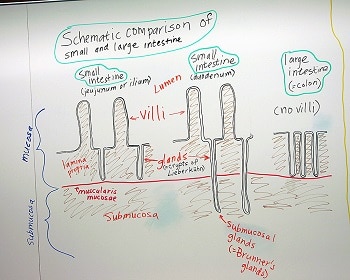
If you’re experiencing symptoms of a condition that includes intense and regular fevers, nausea/vomiting and diarrhea then notate these warning signs to show a gastroenterologist as these are signs of a possibly serious condition known as “bacterial gastroenteritis” which will need to be treated to prevent complications that could arise.
Bacterial gastroenteritis is a condition that develops and occurs whenever bacteria infiltrates your gut can and initiates an infection. If this occurs, inflammation will develop both in your stomach and intestines which will cause discomfort to say the least. Typical symptoms of “bacterial gastroenteritis” includes severe, extreme and persistent cramps in the abdominal area in addition to diarrhea/
While viruses are responsible for the majority of gastrointestinal infections bacterial infections are nearly just as common. A majority of people refer to bacteria-initiated infections as “food poisoning”.
There are a few different causes of “bacterial gastroenteritis” which can be poor hygiene habits, coming in close contact with pets or animals or from consuming foods/fluids that are contaminated with bacteria (even air-borne bacteria). If such warning signs arise, seek medical attention from a physician or preferably a gastroenterologist so the issue(s) can be properly treated to above any further development of bacterial growth.
First and foremost, any sign(s) of rectal bleeding is “not normal” and should never, in any scenario, be dismissed as a minor or non-severe matter as it’s a serious occurrence that requires the attention and treatment from a gastroenterologist.
One of the most prominent signs and symptoms of “irritable bowel syndrome” (IBS) is rectal bleeding and the presence of blood in the stool. In some circumstances, a warning sign is not making a bowel movement at all or only 1-2 times per week.
Blood expressed from the body caused IBD will appear to be “bright red” while if blood is originating from the upper area of the digestive tract the blood will be darker (dark/black stools). If such a sign has arisen be sure that you notate the darkness of the blood so you can provide this detail to a gastroenterologist who will use this information as a part of the diagnosis and treatment(s). In any case, if bleeding from the rectum is “severe” or if you’re throwing-up blood than this is a sign of a severe condition occurring which needs medical attention “immediately”.
Furthermore, such signs could also be a warning sign that you’re suffering from either “Crohn’s disease” or “ulcerative colitis” which are also conditions that you’ll want to have inspected by a GI doctor. Chron’s disease is a condition affecting 200,000 individuals per year and is a chronic, inflammatory irritable bowel disease that runs alone the digestive tract lining.
Ulcerative colitis is another chronic disease that inflames the bowel area which results in the digestive tract becoming inflamed. If any of the warning signs above are occurring, seek medical attention. You don’t want to take the chance of such conditions maturing in growth/size as not only could further complications arise but you may have to undergo additional treatments which otherwise could’ve been avoided had you have the condition(s) treated early on.
Experience vague or minor abdominal pain with a change in bowel movements last for 3+ months? Any changes in your normal bowel movement habits that are lasting for 3+ months is a sign that your body is changing, or, is changing due to an irregular occurrence/condition that should be looked at by a GI doctor; especially when you’re experiencing changes in bowel movement that are lasting for an extended period of time.
Irritable Bowel Syndrome (IBS) is a condition that can spark a significant amount of pain to its victims and will initiate a discomforting agitation feeling in the abdominal area. There are some very common symptoms of having IBS which include constipation, gas and diarrhea (in addition to a pain-induced belly). Having your IBS diagnosed for the severity will help you to have a planned pain-management regiment that will be created for you by the gastroenterologist.
When your stomach is experiencing pain it’s caused from the constipation or the diarrhea although is the painful feeling(s) diminish upon making a bowel movements then more than likely, your symptom(s) are an indicator of your pain being tied to a condition other than IBS (consult a GI doctor for diagnosis). This pain is initiated by contractions which can and will cause intolerable pain that will consume your life, make it difficult to rest and will make it difficult to focus on aspects of life (work for example).
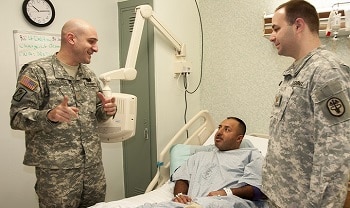
When it comes to your health it’s never a smart idea to over-look symptoms of possible health-related complications and rectal pain, bleeding from the rectum or the presence of blood in your stool are warning signs of a possibly serious complication. If you’re experiencing any of these signs, there’s a possibility that you body is suffering from one or more conditions that include it hemorrhoids, anal fissure, or anorectal cancer (although this is rare).
Hemorrhoids is a condition that should be treated by a GI doctor as Hemorrhoids is a medical condition that means the veins in the rectum and anus have become “swollen” which can cause the veins to bulge which will then result in severe agitation especially during bowel movements. Swollen hemorrhoids may be referred to by your gastroenterologist as “piles” as this is a commonly used medical term for this particular condition.
Hemorrhoids , depending on the severity of you case(if it’s determined by the GI doctor that you in-fact have it), you may undergo an operational procedure where the gastroenterologist will make use of specially designed medical equipment (not that intrusive) to “shrink” and “remove” the hemorrhoids which could actually be done on-site at the GI doctor’s office. Another treatment option is the GI doctor administering an injection in to the hemorrhoid with a specially formulated solution that will result in scarring the hemorrhoid to close it off.
Anal fissure is another condition that could be occurring if bleeding from the rectum is prevalent as this condition is the occurrence of “tearing” in the anus lining which will cause blood to originate out of the rectum which can be noticeable by looking at the stool (is blood noticeable?).
Finally, bleeding from the rectum can “possibly” be a sign of “anorectal cancer ” although this is quite uncommon and not the typical cause of bleeding from the rectal region. “Anorectal cancer” is a malignant infested disease that forms within the tissues and glands of the anus. If you’re suffering with HPV (human papillomaviurs) will increase the chances of “rectum cancer development” so it’s vitally important that you seek diagnosis is warning signs such as rectal bleeding occur.
For elderly/older women, experiencing a bulge or in the rectal area (comparable to a stomach bulge) is a serious sign of either “rectal prolapse” or “vaginal prolapse”; serious yet treatable conditions that can be cured by a gastroenterologist thru the practice of medication(s) or procedural operations.
In the United States it’s estimated that 10% of all elderly women suffer from rectal prolapse with signs ranging from rectal bleeding to the feeling of a “bulge” in the rectal region (noticeable to the touch). Rectal prolapse, specifically, is a condition in which the parts of the large intestine will protrude out of the anus and will cause quite a bit of discomfort, pain, difficulty with making a bowel movement and rectal bleeding.
If such signs occer, don’t procrasitance on receiving treatment. Consult with a GI doctors so treatment preparation(s) can be facilitated.
Vaginal prolapse is another condition that rectal bleeding can be a warning sign of. Vaginal prolapse is a serious condition where the bladder, rectum, urethra, small bowel or uterus will begin to fall out place.
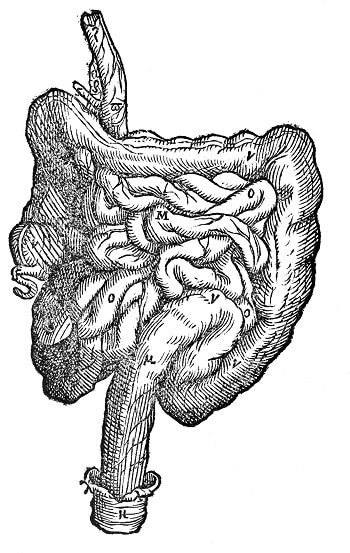
If any of these warning signs occur, it’s time to visit a gastroenterologist so you can receive an accurate diagnosis and treatment.
When it comes to your overall health, maintaining your normal body functions and avoiding complications a gastroenterologist can is a great go-to medical professional as you’ll be able to take advantage of the specialized training that the GI doctors has received so you can alleviate yourself of medical complications.
If any of this signs on this list has occurred, don’t hesitate to seek the intervention of a GI doctor. It’s paramount to ensuring the longevity of your health and will provide you with the peace-of-mind knowing that your symptoms are being affectively diagnosed and of course, treated.
We hope you found this guide helpful. Your gastrointestinal health is important to us and it’s our sincere mission to provide useful medical advice and suggestions.
 Quali cibi dovresti mangiare mentre ti stai riprendendo dalla pancreatite?
Quali cibi dovresti mangiare mentre ti stai riprendendo dalla pancreatite?
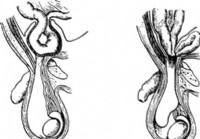 L'ernia inguinale trattenuta - Diagnosi di addome acuto
L'ernia inguinale trattenuta - Diagnosi di addome acuto
 Sana ciotole di felicità che nutrono e curano l'intestino
Sana ciotole di felicità che nutrono e curano l'intestino
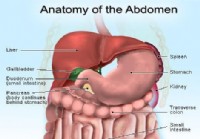 Adesioni addominali
Adesioni addominali
 Quali sono i sintomi tipici della SIBO?
Quali sono i sintomi tipici della SIBO?
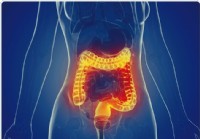 Le cellule immunitarie riparano l'intestino danneggiato nei bambini con IBD
Le cellule immunitarie riparano l'intestino danneggiato nei bambini con IBD
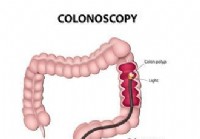 Motivi per cui potresti aver bisogno di una colonscopia
Forse hai sentito le notizie dire che tutti dovrebbero fare una colonscopia dopo una certa età. Forse ti ricordi anche quando Katie Couric del Today Show ha ricevuto una colonscopia. Questa procedura
Motivi per cui potresti aver bisogno di una colonscopia
Forse hai sentito le notizie dire che tutti dovrebbero fare una colonscopia dopo una certa età. Forse ti ricordi anche quando Katie Couric del Today Show ha ricevuto una colonscopia. Questa procedura
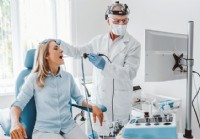 Il diverticolo Zenkers è fatale?
Se non trattato, il diverticolo di Zenker può aumentare il rischio di soffocamento mentre si mangia e di polmonite da aspirazione. Il diverticolo di Zenker (ZD) è una condizione benigna e rara che
Il diverticolo Zenkers è fatale?
Se non trattato, il diverticolo di Zenker può aumentare il rischio di soffocamento mentre si mangia e di polmonite da aspirazione. Il diverticolo di Zenker (ZD) è una condizione benigna e rara che
 bruciore di stomaco:cibi da mangiare, cibi da evitare
Mangiare questo mi fa venire il bruciore di stomaco? Per rispondere a questa domanda, dobbiamo prima capire cosè il bruciore di stomaco. È un fastidio bruciante di solito al centro del torace che co
bruciore di stomaco:cibi da mangiare, cibi da evitare
Mangiare questo mi fa venire il bruciore di stomaco? Per rispondere a questa domanda, dobbiamo prima capire cosè il bruciore di stomaco. È un fastidio bruciante di solito al centro del torace che co